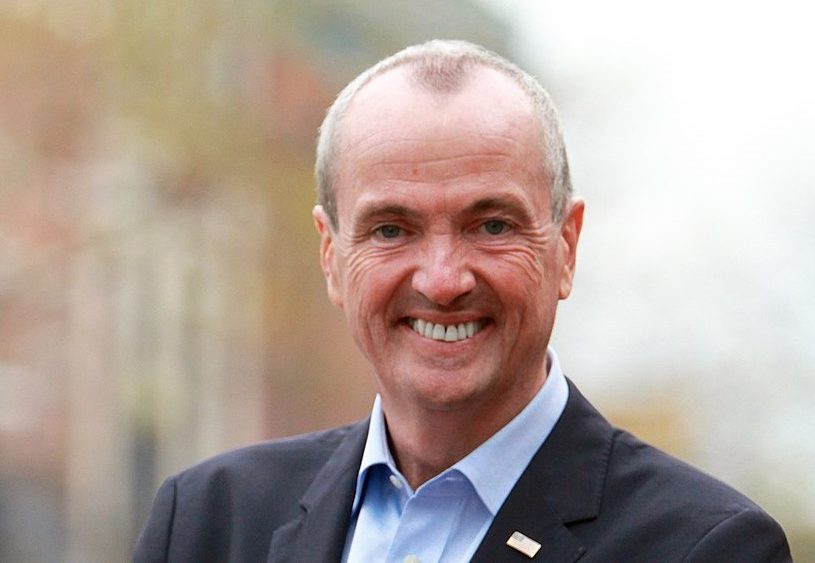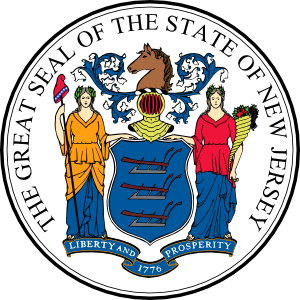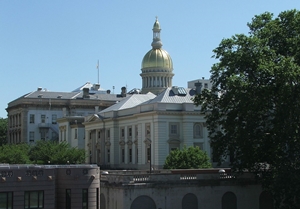June 28, 2023 •
New Jersey Governor Phil Murphy Appoints ELEC Commissioners

New Jersey Gov. Phil Murphy
Gov. Phil Murphy appointed four new commissioners to the state’s campaign finance watchdog agency. The Election Law Enforcement Commission (ELEC) oversees campaign spending, lobbying, and pay-to-play in the state. In addition to providing Murphey with the power to appoint these commissioners, Senate […]
Gov. Phil Murphy appointed four new commissioners to the state’s campaign finance watchdog agency.
The Election Law Enforcement Commission (ELEC) oversees campaign spending, lobbying, and pay-to-play in the state.
In addition to providing Murphey with the power to appoint these commissioners, Senate Bill 2866 made a number of substantial changes to ethics laws.
These changes included increasing spending and contribution limits; overhauling pay-to-play laws; and shortening how long the state’s election watchdog commission can investigate campaign finance violations.
May 20, 2019 •
New Jersey Dark Money Disclosure Bill Vetoed

New Jersey Gov. Phil Murphy
Gov. Phil Murphy conditionally vetoed legislation requiring dark money groups spending money to influence elections in New Jersey to disclose their large donors. Senate Bill 1500, carried over from last year’s session, requires disclosure of contributors giving more than $10,000 […]
Gov. Phil Murphy conditionally vetoed legislation requiring dark money groups spending money to influence elections in New Jersey to disclose their large donors.
Senate Bill 1500, carried over from last year’s session, requires disclosure of contributors giving more than $10,000 to 501(c)(4) groups engaging in political activities and lobbying.
In issuing the veto, Gov. Murphy said the bill contained loopholes and inconsistent disclosure standards.
He also expressed concern about the legislation not passing judicial scrutiny because of broad disclosure requirements beyond spending in elections for groups involved in issue campaigns.
The veto went on to recommend requiring companies receiving large scale tax credits from the state to disclose public contracts and political contributions to the New Jersey Election Law Enforcement Commission (ELEC).
The recommendation also sought to strike a provision limiting elected officials from managing dark-money groups.
Supporters of Senate Bill 1500, which overwhelmingly passed both houses, argued the legislation leveled the playing field by requiring all groups to disclose if trying to sway elections, legislation, or policy.
The legislature can attempt an override of the governor’s veto or work towards amending the bill based on the governor’s recommendations.
October 23, 2015 •
New Jersey ELEC Proposes Changes to Lobbying Registration and Reporting Obligations
The New Jersey Election Law Enforcement Commission has approved the publication of a proposal amending lobbyist registration and reporting obligations. The proposal would require governmental affairs agents and represented entities to file all lobbying forms and reports electronically. A registration […]
 The New Jersey Election Law Enforcement Commission has approved the publication of a proposal amending lobbyist registration and reporting obligations. The proposal would require governmental affairs agents and represented entities to file all lobbying forms and reports electronically. A registration number and PIN supplied by the Commission would act as an electronic signature and acknowledgement for forms and reports submitted electronically.
The New Jersey Election Law Enforcement Commission has approved the publication of a proposal amending lobbyist registration and reporting obligations. The proposal would require governmental affairs agents and represented entities to file all lobbying forms and reports electronically. A registration number and PIN supplied by the Commission would act as an electronic signature and acknowledgement for forms and reports submitted electronically.
Furthermore, when a group of individuals, each registered as a governmental affairs agent, together represents more than one entity, the group will be able to file a notice of representation for a represented entity on behalf of the group. Notice of termination filed by such a group would need to indicate whether termination applies the entire group or to a specific governmental affairs agent.
Additionally, the proposal would require any changes to the notice of representation to be made by electronically filing an amendment. Lastly, the proposal would also require an individual registering as a governmental affairs agent for the first time to personally appear in Commission offices to submit the annual fee and required photographs.
The proposed amendments were published in the New Jersey Register on October 19, 2015, and will be the subject of a public hearing on December 15. If approved following the public hearing, the amendments are expected to go into effect in early February.
March 6, 2015 •
New Jersey Proposes Increase in Lobbyist Registration Fee
The Election Law Enforcement Commission has published a proposed lobbyist registration fee increase in the New Jersey Register. The proposed increase, which would change the registration fee from $425 to $575, is now subject to a 60-day comment period, followed […]
 The Election Law Enforcement Commission has published a proposed lobbyist registration fee increase in the New Jersey Register.
The Election Law Enforcement Commission has published a proposed lobbyist registration fee increase in the New Jersey Register.
The proposed increase, which would change the registration fee from $425 to $575, is now subject to a 60-day comment period, followed by a public hearing scheduled for May 19, 2015.
The registration fee has not changed since 2004.
October 15, 2014 •
ELEC Director Urges New Jersey Legislature to Overhaul Pay-to-Play
Executive Director Jeff Brindle of the New Jersey Election Law Enforcement Commission issued a statement urging the state Legislature to amend existing pay-to-play law. He claims constitutional challenges to federal laws may have ramifications on New Jersey’s law, and a […]
 Executive Director Jeff Brindle of the New Jersey Election Law Enforcement Commission issued a statement urging the state Legislature to amend existing pay-to-play law. He claims constitutional challenges to federal laws may have ramifications on New Jersey’s law, and a complete overhaul is necessary.
Executive Director Jeff Brindle of the New Jersey Election Law Enforcement Commission issued a statement urging the state Legislature to amend existing pay-to-play law. He claims constitutional challenges to federal laws may have ramifications on New Jersey’s law, and a complete overhaul is necessary.
Brindle argues state pay-to-play law is too complex and has unintended consequences. Contractors either stop making contributions altogether, seek ways to legally circumvent the law, or simply break the law. Moreover, donations to transparent entities such as candidates and parties have declined while the activity of PACs and anonymous independent groups has increased significantly.
Because pay-to-play law is worthwhile, Brindle suggests establishing one state law, ending the fair and open loophole, enhancing disclosure, raising the contribution limit, exempting political parties, and including restrictions on contractor contributions to PACs.
The statement represented the personal opinions of Jeff Brindle and not necessarily those of the Commission.
September 26, 2014 •
New Jersey Assemblyman Seeks to Abolish ELEC
New Jersey Assemblyman Michael Patrick Carroll recently introduced Assembly Bill 3650 to abolish the Election Law Enforcement Commission, repeal New Jersey’s restrictions on campaign finance and lobbying, and end public financing of gubernatorial campaigns. Carroll claims contribution limits do not […]
 New Jersey Assemblyman Michael Patrick Carroll recently introduced Assembly Bill 3650 to abolish the Election Law Enforcement Commission, repeal New Jersey’s restrictions on campaign finance and lobbying, and end public financing of gubernatorial campaigns.
New Jersey Assemblyman Michael Patrick Carroll recently introduced Assembly Bill 3650 to abolish the Election Law Enforcement Commission, repeal New Jersey’s restrictions on campaign finance and lobbying, and end public financing of gubernatorial campaigns.
Carroll claims contribution limits do not actually limit contributions but simply encourage candidates to find money in other ways, such as through PACs or other non-profit issue advocacy organizations. He said he’s not wholly averse to reporting contributions, however, and suggested the creation of a website to which every candidate would periodically download contribution and expenditure data.
August 20, 2014 •
Director of New Jersey ELEC Calls for Pay-to-Play Reform
Executive Director Jeff Brindle of the Election Law Enforcement Commission is calling for comprehensive pay-to-play reform after critics revealed a loophole in Trenton’s laws. The loophole became apparent after a South Jersey law firm was awarded a contract with the […]
 Executive Director Jeff Brindle of the Election Law Enforcement Commission is calling for comprehensive pay-to-play reform after critics revealed a loophole in Trenton’s laws. The loophole became apparent after a South Jersey law firm was awarded a contract with the city worth up to $20,000.
Executive Director Jeff Brindle of the Election Law Enforcement Commission is calling for comprehensive pay-to-play reform after critics revealed a loophole in Trenton’s laws. The loophole became apparent after a South Jersey law firm was awarded a contract with the city worth up to $20,000.
One of the firm’s founding partners was serving as the treasurer of a PAC when the PAC donated $8,200 to the election campaign of Trenton Mayor Eric Jackson. Because neither the law firm nor any of its partners made a donation to the PAC, the contract award was not deemed a violation of the city’s pay-to-play law.
Critics, however, want the law revised to include such contract awards. Part of Brindle’s recommendations for reform include simplifying complex laws, creating a single pay-to-play law to apply to all governments at the state, county, and local levels, and prohibiting the pay-to-play loophole for publicly bid contracts.
April 20, 2013 •
NJ ELEC Makes Recommendations in Annual Report
2012 Annual Report
 In the 2012 Annual report issued by the New Jersey Election Law Enforcement Commission (ELEC) on April 15, the Commission listed several recommendations and ideas to strengthen the state’s campaign finance and lobbying laws.
In the 2012 Annual report issued by the New Jersey Election Law Enforcement Commission (ELEC) on April 15, the Commission listed several recommendations and ideas to strengthen the state’s campaign finance and lobbying laws.
ELEC recommends requiring disclosure from super PACs and non-profit groups organized under Section 527 and Section 501(c) of the IRS code, requiring disclosure of lobbying activity by local vendors who are required to report pay-to-play contributions, and expanding the 48-hour notice requirement for continuing PAC expenditures to require the filing of notices for expenditures made in May municipal, runoff, school, and special elections.
Among its other recommendations, ELEC calls for the state to expand the regulation of “wheeling” to include contributions by county political party committees to other county political party committees during the entire year.
In the report, the Commission also lists general ideas to strengthen the laws, including requiring grassroots lobbying materials to list the name and address of the committee paying for the material, increasing penalties for public financing violations, and banning the use of partnership funds for the purpose of making contributions.
The annual report can be found here.
April 16, 2013 •
Tuesday Lobbying and Campaign Finance News
Keep up with the latest government relations news with these articles:
 Lobbying
Lobbying
“Bottom Line” in The Hill.
New York: “Small business speaks up during Capitol lobbying day” by Adam Sichko in the Business Review.
Campaign Finance
“Senate Scrutiny of Nonprofits Spurring Disclosure: Taxes” by Jonathan D. Salant in Bloomberg.
California: “CA pushes to fine ‘independent’ campaign committee for supporting lawmaker” by Jim Sanders in the Sacramento Bee.
New Jersey: “ELEC outlines list of campaign finance priorities” by Darryl R. Isherwood in PolitickerNJ.
New York: “Overhauling campaign finance rules” opinion piece by Jeffrey D. Klein in the Albany Times Union.
Ethics
New York: “Campaign Finance Trial For Two Former Liu Associates Under Way” by The Associated Press on CBS New York.
Texas: “Bill would revise ethics oversight” by Chris Tomlinson (Associated Press) in the Austin American-Statesman.
From the State Legislatures
Minnesota: Senate: “Time to raise pay for Minnesota’s lawmakers” by Rachel E. Stassen-Berger in the Star Tribune.
New York: “Lawmakers return to Albany after bribery scandals” by Joseph Spector in the Star Gazette.
West Virginia: “Lawmakers push for special session to address bills” by Dave Boucher in the Charleston Daily Mail.
Advisory Opinion 01-2013
 On March 21, 2013, the New Jersey Election Law Enforcement Commission (ELEC) issued an advisory opinion deciding it does not have the jurisdiction to declare contribution limits unenforceable or unconstitutional for political committees making only independent expenditures.
On March 21, 2013, the New Jersey Election Law Enforcement Commission (ELEC) issued an advisory opinion deciding it does not have the jurisdiction to declare contribution limits unenforceable or unconstitutional for political committees making only independent expenditures.
Advisory Opinion 01-2013 holds current state registration and reporting requirements and contribution limits apply to political committees making independent expenditures.
Fund for Jobs and Growth, a political organization not registered in the state and intending to make independent expenditures in the state’s 2013 elections, requested the opinion in order to determine whether it needed to register and report with the state and whether the state contributions limits for political committees applied to its fundraising activity. The organization was held to be a political committee requiring registration and reporting.
While holding state contribution limits apply, the opinion notes several other jurisdictions have held contribution limits applied to political committees making independent expenditures are unconstitutional. ELEC did not find “that the Third Circuit Court of Appeals has addressed these issues, nor has the United States Supreme Court issued a specific determination concerning the constitutionality of contribution limits for political committees making only independent expenditures.”
October 15, 2012 •
ELEC Meeting Tomorrow to Consider Electronic Filing for Lobbyists’ Annual Reports
Additional Issues to be Discussed
 Tomorrow at a public hearing at its offices at 11:00am, the New Jersey Election Law Enforcement Commission (ELEC) will consider proposed changes to the administrative code allowing for electronic filing for lobbyists’ annual reports.
Tomorrow at a public hearing at its offices at 11:00am, the New Jersey Election Law Enforcement Commission (ELEC) will consider proposed changes to the administrative code allowing for electronic filing for lobbyists’ annual reports.
Electronic filing would be mandatory through ELEC’s website and would replace the requirement to file paper copies. Copies of what a lobbyist files electronically must be retained by the lobbyist. The proposed amendments cover governmental affairs agents, represented entities, and representatives of “persons communicating with the general public.” The proposals also make technical changes, such as substituting “represented entity” for “lobbyist” throughout the relevant sections.
Other issues to be addressed at the meeting include proposed amendments concerning campaign cost index adjustments and personal financial disclosure statements by candidates.
June 20, 2012 •
NJ ELEC Votes To Raise Political Contribution Amounts
Inflation-Adjusted
 The New Jersey Election Law Enforcement Commission (ELEC) has voted unanimously to raise the inflation-adjusted limits and thresholds for political contributions beginning in 2013.
The New Jersey Election Law Enforcement Commission (ELEC) has voted unanimously to raise the inflation-adjusted limits and thresholds for political contributions beginning in 2013.
If accepted by the legislature, contributors would be able to give up to $3,800 per election to gubernatorial candidates. The contribution limits from single donors for non-gubernatorial candidates would increase from $2,600 to $3,000.
Additionally, political committee reporting thresholds for non-gubernatorial candidates and committees would increase, as would penalties for violations.
According to the press release from ELEC, gubernatorial candidates who qualify for public funding could spend a maximum of $5.6 million in primary elections and $12.2 million in general elections.
The commission has until December 15th to report to the legislature its final limits and threshold adjustments.
The ELEC 2013 Cost Index Report can be downloaded here.
April 9, 2012 •
ELEC Says PAC Contributions from Contractors Increasing
Calls for Reform
 Jeff Brindle, Executive Director of the New Jersey Election Law Enforcement Commission (ELEC), has renewed efforts calling for campaign finance reform, specifically concerning political contributions from contractors.
Jeff Brindle, Executive Director of the New Jersey Election Law Enforcement Commission (ELEC), has renewed efforts calling for campaign finance reform, specifically concerning political contributions from contractors.
In a press release detailing public contractors’ political contributions for 2011, ELEC’s analysis concludes that while contractors are making fewer contributions directly to candidates, they are making substantially more contributions to PACs.
Director Brindle states, “In some cases, contractors may be evading the intent of pay-to-play restrictions and contribution limits by giving indirectly through these PACs. That is why the Commission has recommended making it harder for one candidate or group to establish multiple, affiliated PACs.”
Director Brindle also reiterates the Commission’s recommendation to adopt a single statewide pay-to-play law. Previous LobbyComply blog posts discusses the earlier recommendations can be found here and here.
February 8, 2012 •
NJ ELEC Has the Power
Appellate Court Affirms New Jersey Election Law Enforcement Commission’s Authority
 A New Jersey state appellate court has reaffirmed the New Jersey Election Law Enforcement Commission (ELEC) has the authority to enforce the state’s campaign finance laws.
A New Jersey state appellate court has reaffirmed the New Jersey Election Law Enforcement Commission (ELEC) has the authority to enforce the state’s campaign finance laws.
In Nordstorm v. Lyon, the Appellate Division reversed a lower court’s decision not to defer to ELEC’s jurisdiction for enforcement of campaign contributions and reporting violations.
In affirming the power of ELEC, the Appellate Division held, “We reach our conclusion that ELEC has exclusive jurisdiction regarding reporting violations because of the overarching legislative goals of (1) guaranteeing transparency of campaign contributions and expenditures, (2) ensuring that disclosures of the same be managed and controlled by a single agency, and (3) implementing remedies for violations of the Reporting Act through a uniform and predictable system of sanctions.”
The case arose following a close Republican Party primary election for Morris County Freeholder between William “Hank” Lyon and Margaret Nordstrom. In its press release, ELEC Executive Director Jeff Brindle said if the lower court ruling had not been overturned, “it would have subjected candidates and committees to inconsistent application of the Campaign Reporting Act in enforcement actions.’’
State and Federal Communications, Inc. provides research and consulting services for government relations professionals on lobbying laws, procurement lobbying laws, political contribution laws in the United States and Canada. Learn more by visiting stateandfed.com.

